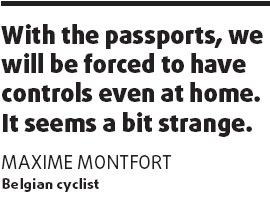'Vampires', biological passports open new frontiers of fear
PARIS: For Belgian cyclist Maxime Montfort, and many others, the drug testers who come calling are "vampires." But such is the climate of fear gripping his dope-tainted sport, and he goes to extraordinary measures to protect himself.
The decision by the UCI, the world governing body of cycling, to introduce biological passports, a uniquely personal record of every rider in the peloton, has caused concern.
The UCI plans to increase the number of tests in 2008 with each rider facing 12 controls, resulting in 8,400 tests in total.
In order to carry out these tests in the right conditions, the UCI will have to be in possession of all the information concerning the whereabouts and training schedules of all the riders.

"With the passports, we will be forced to have controls even at home. It seems a bit strange," said Montfort.
Since January 1, the date for passports to be introduced, Montfort has been awaiting the UCI "vampires", who have come to be known as such by the peloton because of their arrival at ungodly hours seeking blood samples.
He keeps track of cinema tickets to prove his whereabouts if not at home.
"I have a friend who owns a restaurant where my mobile phone has no signal. I always ask him for a bill as evidence I was there, in fear of missing a check."
The memory of disgraced Dane Michael Rasmussen is fresh in the minds.
Rasmussen was thrown off the 2007 Tour de France while wearing the leader's yellow jersey for lying about his whereabouts the previous month when he was being sought out for doping tests.
Not all riders share Montfort's suspicions.
French rider Sebastian Chavanel says Montfort is being "paranoid".
"If there is a change in a timetable, we can communicate by text or by phone and then send a confirmation e-mail," he said.
Riders have two hours to react if a controller has not found him at home.
"That leaves time to come back from the cinema. There is no need to exaggerate, we are not prisoners," Chavanel says.
Backing the new rules, Chavanel believes they could be the best way to "clear our sport of cheats".
"I'm not afraid of errors," said Rony Martias of Bouygues Telecom, adding those "who do nothing wrong have nothing to worry about".
The passports will contain results of individual urine and blood tests aimed principally at measuring blood and steroid parameters. Any dramatic changes are likely to raise testers eyebrows, and prompt closer scrutiny.
But a crucial question during months-long scientific and legal debates among experts of the UCI, the World Anti-Doping Agency (WADA) and the French Sport Ministry was to define "acceptable" measures.
Matthieu Reeb, secretary general of the Court of Arbitration for Sport (CAS), expects a flow of appeals and estimates the first cases that CAS would judge will be crucial for the future of the new measures.
With biological passports, the first questions CAS judges would face was whether this method is "reliable."
"The method of analysis and its interpretation must be totally reliable," Reeb says.
He insists it was up to the parties - both sports federations and sportsmen in question - "to provide evidence".
"It will be a question of confronting evidence and expertise and it will be up to the CAS to evaluate them," Reeb said.
But Reeb said it was necessary to "quickly" create a judicial system and enable clear interpretation of what "sanctions are applicable to what offense".
UCI legal expert Philippe Verbiest says talks are underway to clarify the methods used both scientifically and legally.
Tests throughout the season will monitor any irregular biological changes occurring in cyclists, and which signal possible doping violations.
"The first case we get will be crucial to know if this indirect method could be juristically valid," said Reeb.
AFP
(China Daily 02/27/2008 page22)














